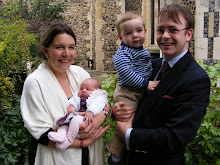Last week on camp we did Bible studies in Genesis 1-3 and Revelation 22.
Following my previous post, let me highlight that this is a tentative suggestion.
For the first time I noticed the disruption in the pattern "And God saw that it was good." Usually, this phrase summarises God's judgement on a whole series of creative acts (1:10, 12, 18, 21, 25).
In 1:3, if it anticipated the other instances we might expect, "God called the light 'day', and the darkness he called 'night'. And God saw that it was good." But, the phrase comes earlier. Specifically, we are told that light is good, but we are told nothing evaluative about darkness. What do we make of this?
Is it the case that darkness is bad? Can anything in God's original creation be bad? I doubt we would be comfortable saying this.
Is darkness neutral? Is anything morally neutral? Again, I feel uncomfortable with this.
Is darkness less good? Perhaps. In 1:2, we have darkness and no light. I assume, though we're not told, that creation is good even in its formless and dark state. But the clear message of Genesis 1-2 is that order and form and fullness are better than disorder and emptiness. Just as creation without man is good, but with man, it is very good, perhaps we may say, creation with light is better, more good, than without?
Of course, the new creation has no darkness at all (Rev 22:5).
In biblical theology, darkness (John 3:19) comes to be wicked, through association with sin and contrast with light. Must that mean darkness is bad in the beginning?
Thoughts please?
Tuesday, 7 August 2007
Subscribe to:
Post Comments (Atom)

5 comments:
Neil
Gen 1 sets up an eschatology: darkness to light and (implicitly) heaven-divided-from-earth (note that day 2 is the only day not pronounced good) to heaven and earth united (Rev 22). The darkness to light works at both macro and micro levels (hence each day moves from evening to morning). Now, given that this is eschatology, the question becomes "what time is it?" If it's evening, darkness isn't bad per se, it's natural to evening/night; however, it's not good in the sense of not being the goal of the journey, which is light. But if it's daytime, darkness is just plain bad (cf. Exod 11; Mk 15.33). And so, when Light comes into the world, darkness is capital B Bad. But until then, perhaps walking in darkness isn't morally bad, it's just the way things are - incomplete, immature, waiting for the Light.
So, here's a conjecture, is John 3.19 actually more about salvation history than abstract moral categories. That is, is it saying men loved darkness [moral evil] because their deeds were evil; or is it saying "men loved darkness [the Old covenant/creation order, which is not bad in itself, but has now passed its sell-by date because the Light has come. And why would they refuse the Light/Messiah?...] because their deeds were evil" I'm not sure how that would fit with v. 20 though...
Great to have you blogging!
Matthew
If darkness is a created thing it must be good in its place, for the purposes given etc since God only makes good things. Nights should be dark for sleep and rest (good) but not dark for sin (bad) and not ultimate (there will be no night). Darkness considered as a privation of light could be evil just as sin is a privation of goodness not a thing God made.
Acts 26:17-18 associates darkness with Satan's dominion. Whilst this fits with the 'darkness as old creation order' reading (i.e. when the Gentiles were in darkness under Satan) it doesn't sit easily with the suggestion that such darkness was ok at a particular time in redemptive history.
Quite clearly here (and in Colossians 1:12-13)Paul is drawing on Exodus imagery. There the darkness was God's punishment upon Pharaoh - a suitable undoing of creation to reward Pharaoh's anti-creation opposition to the LORD. In that sense, the darkness was in a sense 'good' (it served to demonstrate God's saving glory - though even sin does this) and yet also obviously bad.
It seems to me that there might well be different (but connected) types of 'darkness'.
And, of course Neil, 'The Darkness' most pertinent for you in sermon preparation are the Lowestoft-born retro-rockers once fronted by Justin Hawkins.
Pete, helpful corrective; thanks.
I discovered some insightful comments on these verses today that combine what I said with your comments.
M
I think that what both Pete and Matthew are saying is, we must distinguish. ;)
Post a Comment